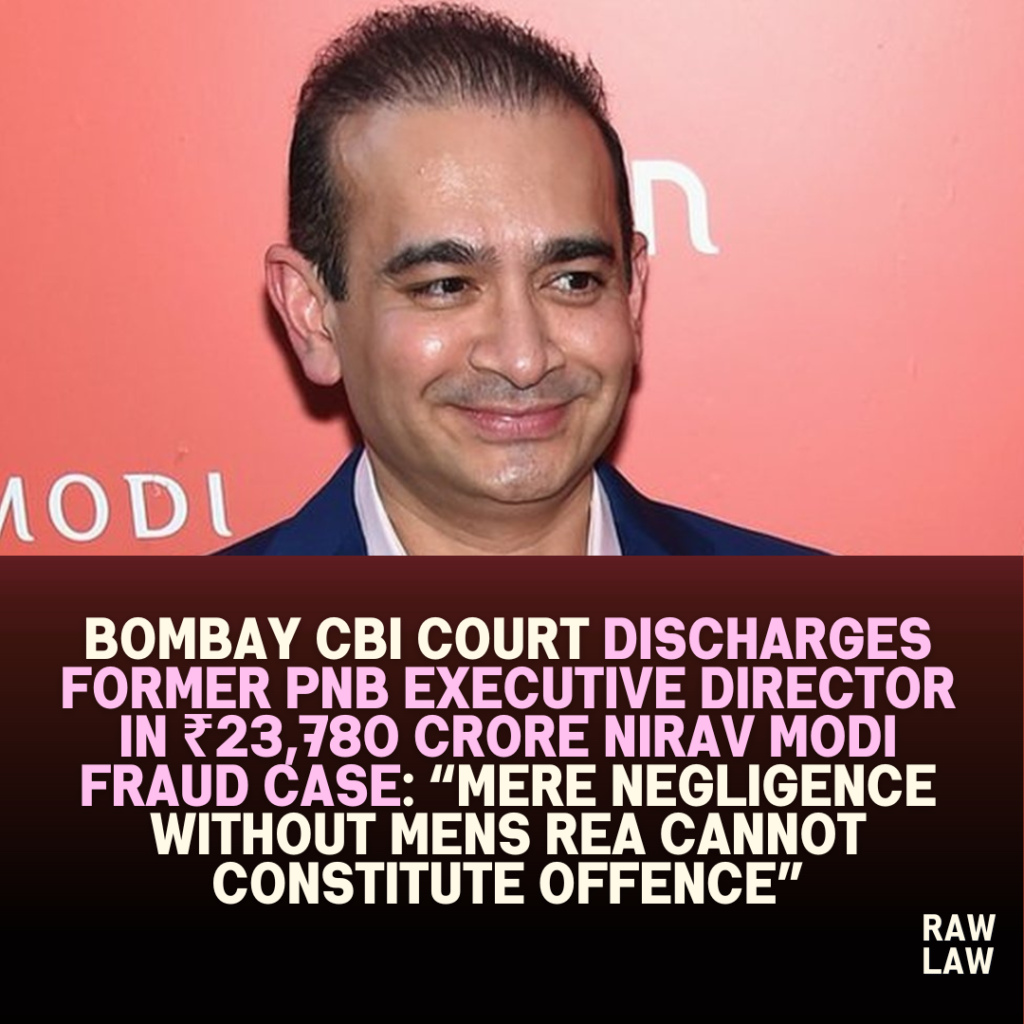Court’s Decision
The Special CBI Court, Greater Mumbai, allowed the discharge application of K.V. Brahmaji Rao (Accused No. 20), former Executive Director of Punjab National Bank, in the multi-crore Nirav Modi–PNB fraud case. The Court held that no prima facie case of conspiracy, cheating, or corruption was made out against him. It emphasized that “in the absence of mens rea, mere negligence or dereliction of duty cannot fasten criminal liability”K.V. Brahmaji Rao.
Facts
- On 31 January 2018, CBI registered a case based on a complaint by Punjab National Bank against Nirav Modi, Mehul Choksi, and PNB employees Gokulnath Shetty (Deputy Manager) and Manoj Kharat (SWO) for issuing fraudulent Letters of Undertaking (LOUs) without approvals or CBS entries, causing wrongful loss.
- Investigation later revealed that 1214 fraudulent LOUs amounting to USD 3.73 billion (₹23,780 crores) were issued between 2011–2017.
- Charge sheets were filed in 2018 and 2019 implicating senior PNB officials, including Rao, for failure to act upon RBI circulars and caution notices relating to SWIFT–CBS integration and fraud risk management.
Issues
Whether K.V. Brahmaji Rao, as Executive Director of PNB, could be held criminally liable for conspiracy, cheating, and corruption under Sections 120-B, 420, 409 IPC and Section 13 of the Prevention of Corruption Act, 1988, despite absence of direct involvement in issuance of fraudulent LOUsK.V. Brahmaji Rao.
Petitioner’s Arguments
- Rao was only involved in policy-making decisions and had no role in branch-level operations.
- Brady House branch fraud was a localized act by junior employees, unnoticed even by auditors and zonal officers.
- There is no evidence of meeting of minds or conspiracy under Section 120-B IPC.
- He did not receive any pecuniary benefit or gratification.
- Reliance was placed on precedents such as Union of India v. Prafulla Kumar Samal (1979), CBI v. K. Narayana Rao (2012), Sunil Bharti Mittal v. CBI (2015), holding that vicarious liability cannot be imposed in criminal law without specific evidence of mens reaK.V. Brahmaji Rao.
Respondent’s Arguments
- Prosecution argued that as Executive Director, Rao had knowledge of RBI caution notices on SWIFT-related fraud and failed to implement corrective measures.
- His omission to act upon RBI circulars facilitated commission of the fraud.
- Reliance was placed on judgments such as Bhalchandra v. State of Maharashtra (1968), Sudhir Shantilal Mehta v. CBI (2009), and P.B. Desai v. State of Maharashtra (2013), to argue that illegal omissions can also constitute criminal actsK.V. Brahmaji Rao.
Analysis of the Law
- Section 239 Cr.P.C. empowers discharge if charges are groundless.
- Court reiterated principles from State of Bihar v. Ramesh Singh (1977), Prafulla Kumar Samal (1979), and Dilawar Balu Kurane (2002), holding that strong suspicion alone cannot justify trial unless supported by evidence.
- Criminal liability requires actus reus plus mens rea. Mere lapses in implementing RBI circulars cannot substitute for dishonest intentK.V. Brahmaji Rao.
Precedent Analysis
The Court relied on C.K. Jaffer Sharief v. State (CBI) (2013) 1 SCC 205 and Mahmood Asad Madani v. CBI (2019) to stress that dishonest intention is sine qua non under Section 13(1)(d) PC Act. Procedural irregularities, without corrupt intent, do not amount to misconduct.
It also cited Sunil Bharti Mittal v. CBI (2015), ruling that criminal liability cannot be based on status alone.
Court’s Reasoning
- Rao’s role as Executive Director was confined to policy framing, not branch-level supervision.
- He had convened meetings after receiving RBI’s August 2016 circular; the delay in SWIFT–CBS integration was attributable to the IT Division and MD/CEO, not him.
- Fraud was localized to Brady House branch; no evidence showed Rao conspired, gained benefit, or acted dishonestly.
- Selective prosecution of Rao, while excluding similarly placed officials, amounted to unfair “pick-and-choose.”
The Court categorically held:
“Mere fact that the offence is a serious economic offence involving thousands of crores is no ground to drag everyone into the prosecution who is not remotely connected with the crime.”K.V. Brahmaji Rao
Conclusion
The Court discharged Rao from all charges, finding that the prosecution failed to establish a prima facie case of conspiracy, cheating, or corruption. Procedural lapses, if any, did not amount to criminal misconduct in absence of mens rea.
Order:
- Application under Section 239 Cr.P.C. allowed.
- K.V. Brahmaji Rao discharged from offences under Sections 120-B, 420, 409 IPC and Section 13 PC Act in Special Case No. 37/2018K.V. Brahmaji Rao.
Implications
- The ruling underscores that executives cannot be criminally prosecuted for systemic lapses without evidence of dishonest intent.
- Reinforces principle that seriousness of offence cannot dilute requirement of mens rea.
- Sets precedent limiting prosecution of board-level officers in large corporate/banking frauds absent proof of conspiracy.
Legal Representation
- For the Applicant (Accused No. 20 – K.V. Brahmaji Rao):
Mr. Subhash Jha, Advocate with Ms. Rajul Jain and Mr. Chaitanya MalgaonkarK.V. Brahmaji Rao. - For the Prosecution (CBI):
Ld. Public Prosecutor Limosin.



